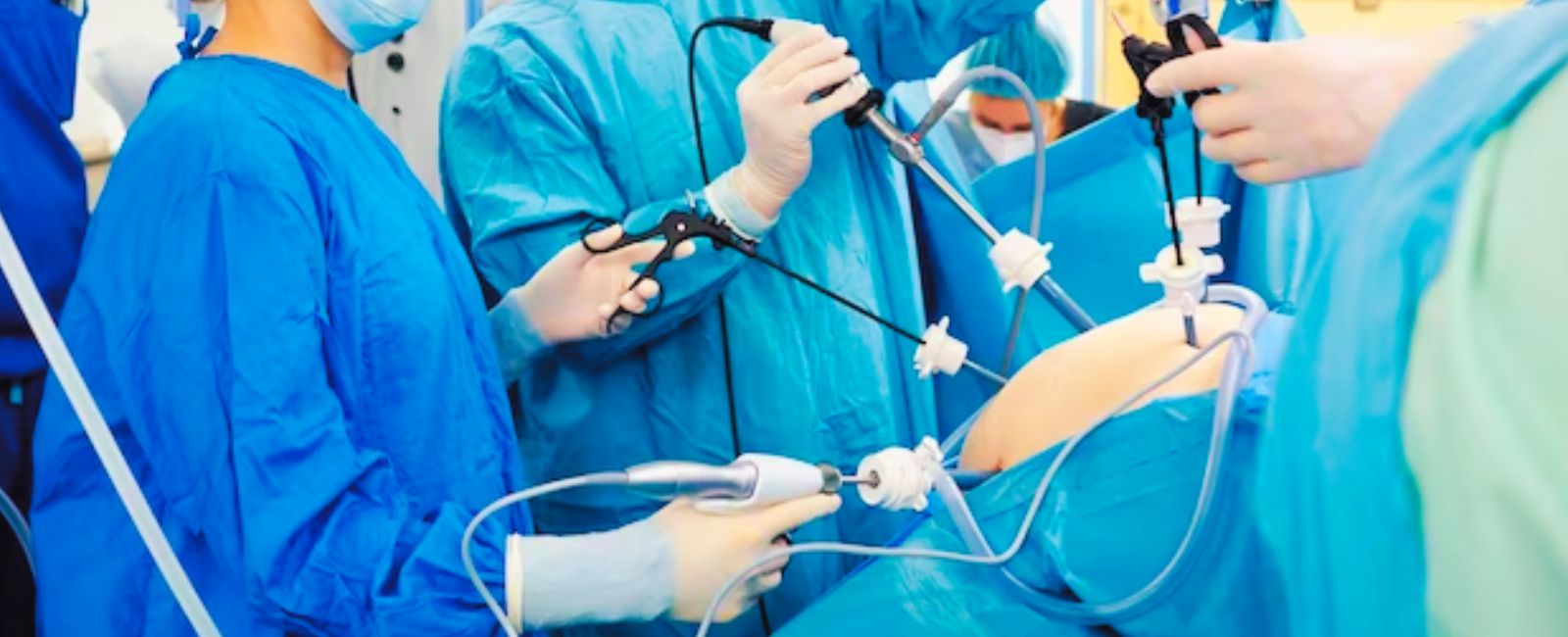
Laparoscopic Gastrointestinal (GI) Surgery

What is Laparoscopic GI Surgery?
Laparoscopic gastrointestinal (GI) surgery is a type of minimally invasive surgery that is performed using small incisions and specialized instruments. Instead of making a large incision, the surgeon uses several small incisions, each about the size of a buttonhole, to perform the procedure.
A laparoscope, which is a thin, tube-like instrument with a light and camera at the end, is inserted through one of the incisions to provide the surgeon with a clear view of the inside of the abdomen. The other incisions are used to insert specialized instruments to perform the surgery.
This type of surgery is less invasive than traditional open surgery and can result in less pain, a shorter recovery time, and less scarring. Examples of laparoscopic GI surgery include laparoscopic cholecystectomy (removal of the gallbladder), laparoscopic colectomy (removal of all or part of the colon), and laparoscopic gastrectomy (removal of all or part of the stomach). Dr. Jagan Mohan Reddy is an expert laparoscopic GI cancer surgeon. With years of laparoscopic experience, he can treat a plethora of gastrointestinal diseases and ensure faster recovery for his patients.
What surgeries are performed laparoscopically?
A laparoscope is a small, thin tube with a camera and light on the end. Laparoscopic surgery, also known as minimally invasive surgery, is a type of surgery that uses small incisions and special instruments to perform procedures through a laparoscope. Some examples of surgeries that can be performed laparoscopically include:
- Appendectomy
- Cholecystectomy (removal of the gallbladder)
- Colorectal surgery
- Gynecologic surgery (such as hysterectomy and ovarian cyst removal)
- Hernia repair
- Nephrectomy (removal of a kidney)
- Splenectomy (removal of the spleen)
- Adrenal gland surgeries
- Bariatric surgery, such as gastric sleeve, roux-en-y bypass and gastric banding.
It’s important to note that the use of laparoscopic techniques varies depending on the specific procedure and the surgeon’s experience and preference.
Benefits of Laparoscopic Surgery:
Minimal Invasiveness: Laparoscopic surgery is less invasive than traditional open surgery, which means that the incision is smaller and there is less damage to the surrounding tissue. This results in less pain and a quicker recovery time.
Reduced Blood Loss: Because the incision is smaller, there is less blood loss during the surgery. This reduces the risk of complications and the need for blood transfusions.
Shorter Hospital Stay: Due to the minimal invasiveness of the procedure, patients are able to leave the hospital sooner and resume normal activities more quickly.
Reduced Scarring: The smaller incision means less scarring, which can be especially important for patients who are concerned about their appearance.
Better Visualization: The use of a laparoscope allows the surgeon to see the internal organs more clearly, which improves the accuracy and precision of the surgery.
Reduced Risk of Infection: Because the incision is smaller, there is less risk of infection. Additionally, the use of the laparoscope means that the surgeon does not need to touch the internal organs directly, which further reduces the risk of infection.
Cost-effective: Laparoscopic surgery is often more cost-effective than open surgery because it requires less recovery time, less post-operative care, and fewer complications.
Our Approach and Technology
At Dr. Jagan Gastrocare, we are committed to providing personalized care and adopting the latest advancements in laparoscopic surgical techniques. Our state-of-the-art operation theaters are equipped with cutting-edge technology, enabling our surgeons to perform complex procedures with precision and accuracy.
Patient-Centered Care
We understand that undergoing surgery can be a significant decision, and we strive to create a supportive and compassionate environment for our patients. From the initial consultation to postoperative care, our team is dedicated to ensuring your comfort, answering your questions, and guiding you through every step of your surgical journey.
Schedule a Consultation
If you are facing a gastrointestinal condition that may require surgery, we encourage you to schedule a consultation with our experienced laparoscopic GI surgeons. During the consultation, we will thoroughly evaluate your condition, discuss treatment options, and provide personalized recommendations to help you make an informed decision about your healthcare.
Contact Us
To learn more about Laparoscopic Gastrointestinal (GI) Surgery or to schedule a consultation, please contact us. Our friendly staff will be happy to assist you and address any concerns you may have.
Frequently Asked Questions(FAQ)
What is Laparoscopic GI Surgery?
How is Laparoscopic GI Surgery performed?
Is Laparoscopic GI Surgery safe?
What is the recovery like after Laparoscopic GI Surgery?
Will I have dietary restrictions after Laparoscopic GI Surgery?
How do I schedule a consultation for Laparoscopic GI Surgery?
Success Stories
A true Master in his job!!! His expertise, care, calm approach towards patients & family - I just liked everything about Dr. Jagan Sir.
Meet Our Specialist
Dr. B Jagan Mohan Reddy is an experienced Gastroenterologist Surgeon in Hyderabad with an overall experience of 14 years.
Dr B Jagan Mohan Reddy
drjagangastrocare.com
MBBS,MS, M.CH Consultant Surgical Gastroenterologist, Laparoscopic, Bariatric, Advanced Robotic, Colorectal, Hepato Biliary & Pancreatic Surgeon

